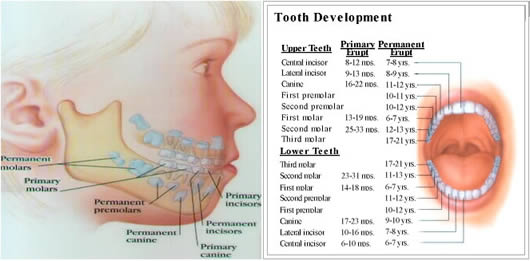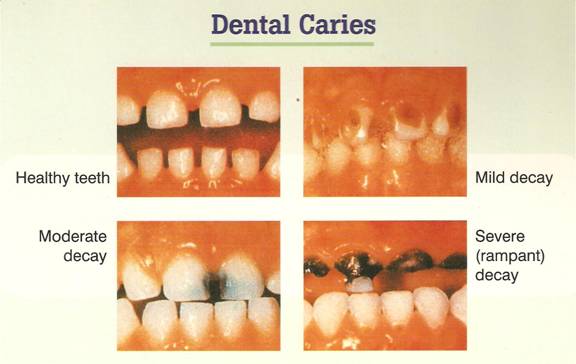
Pedodontics
Pedodontics, or pediatric dentistry, deals specifically with the oral care of children. A Pedodontist, or pediatric dentist, receives training in child psychology, growth and development. They are an ideal choice for children with fears or behavioural problems that make visits to the regular dentist unproductive.
Babies are born with their primary teeth formed underneath the gums, but they don’t start appearing until many months later, usually between six to seven months after birth; however, there is considerable variation in the timing.

Primary teeth are also called baby teeth, milk teeth, or first teeth. Baby teeth are very important as place holds for permanent teeth. There a couple of simple rules that usually applies to the eruption of baby teeth:-
- lower teeth usually erupt before upper teeth
- girls teeth usually erupt before boys teeth of the same age
- teeth usually erupt in pairs
Your child’s first baby tooth is another milestone in the growth of a child. Parents love to celebrate the tiny, yet momentous steps that pave a child’s healthy development. Keeping your child free of tooth decay is the goal. A little effort may reveal the secrets how dentists keep their own children cavity free. Pedodontics focuses heavily on preventative oral care to reduce the risk of future complications like thumbsucking in the children, thus possibly reducing the risk of overbite. A Pedodontist may also start interceptive orthodontic treatment to prepare a child’s mouth for future orthodontic work.
By the child is nearly 18 months old, start keeping him from bottles by this age. Doing so will help prevent Baby Bottle Tooth Decay. By the time children are three years old, they usually have a full set of 20 primary teeth. Faulty brushing habits coupled with the consumption of sticky substances are generally responsible for triggering dental decay or dental caries in milk teeth.

Baby Bottle Tooth Decay
Another problem that can be spotted early is a condition called “baby bottle tooth decay,” which is caused by sugary substances in breast milk and some juices, which combine with saliva to form pools inside the baby’s mouth. If left untreated, this can lead to premature decay of your baby’s future primary teeth, which can later hamper the proper formation of permanent teeth.
Putting a baby to bed for a nap or at night with a bottle other than water can cause serious and rapid tooth decay. Sweet liquid pools around the child’s teeth giving plaque bacteria an opportunity to produce acids that attack tooth enamel.
One of the best ways to avoid baby bottle tooth decay is to not allow your baby to nurse on a bottle while going to sleep. Avoid dipping pacifiers in sweet substances such as honey, because this only encourages early decay in the baby’s mouth. Encouraging your young child to drink from a cup as early as possible will also help stave off the problems associated with baby bottle

Permanent teeth usually start to erupt about first grade. A special note here is that often the first molar, or six-year molar, erupts before the front tooth. Additionally, the first molar erupts behind the last baby tooth and does not replace a baby tooth as occurs for front teeth. Often lower front teeth come in behind, on the tongue side, and give the appearance for a while as if there are two rows of teeth.
If baby teeth are lost too early, the other teeth can drift out of their position and invade the empty space. This might cause permanent teeth to come in crooked or unable to erupt into the gum, which leads to malocclusion.
Children suck on things because sucking is one of a baby’s natural reflexes and as infants get older it serves many purposes. Since thumbsucking is relaxing, it may help induce sleep. After the permanent teeth come in, sucking may cause problems with the proper growth of the mouth and alignment of the teeth. It can also cause changes in the roof of the mouth. Some aggressive thumbsucking may cause problems with the baby (primary) teeth. It can also cause changes in the roof of the mouth.
Pacifiers can affect the teeth essentially the same ways as sucking fingers and thumbs. However, it is often an easier habit to break.

